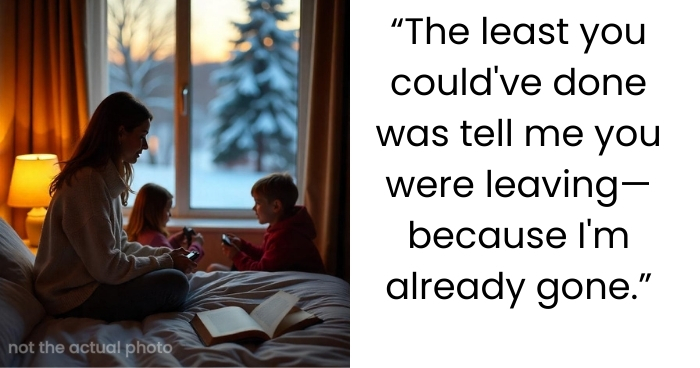AITA for considering divorcing my husband after he left my kids and me while on a family vacation?
The OP (original poster), a woman in her 40s, reflects here on what happened to her marriage in this often times gut-wrenching post that begins with a family trip during New Year’s that catapults into her relationship’s demise. OP has been married for over a decade and has two young children, but he describes a growing rift and unequal marriage. The blog post centers on the surprise decision of her husband to leave a family vacation early, flying home even after almost no discussion of the plans with her. Add this sudden abandonment to a long list of complaints (his ongoing refusal to pitch in within the family, the refusal to drive, emotional unavailability, and the constant simmer of resentment and passive aggression),
OP took care of basically all the moving and the emotional pieces of this trip (and their lives), and her husband did nothing to help and then ditched her and the kids during the vacation. To add insult to injury, he told one of their kids about his walking away before he told her, which sent her spiraling back to her own childhood and being the messenger in her own broken family. OP has probably resentful of that but ESPECIALLY since he emotionally neglected her recently when she had a health scare over getting a lumpectomy. While OP and her husband have discernment therapy lined up to find out if their marriage stands a chance, OP is wondering whether there is even such a thing as a road back from a spouse’s most recent betrayal.
Read for more info Reddit





































Emotional Neglect: Relationship Red Flags and Legal Precedents
More context: OP’s story highlights some very big red flags in marriages at risk of collapse. These are just a few of the common behaviors, including stonewalling as well as contempt and emotional neglect, that predictive of divorce, say Drs. John and Julie Gottman of the “Four Horsemen of the Apocalypse” of relationships: criticism, contempt, defensiveness, and stonewalling. This means that, at least three times each week, her husband expresses one or more of these sundries, creating an emotional environment in which the OP feels neglected and patronized and emotionally crushed.
Additionally, emotional neglect is a relatively silent and devastating form of relational harm. When people don’t get that emotional support from partners while going through major life events (like learning you have a medical issue, giving birth, or facing a family crisis) feelings of isolation and bitterness can actually be worsened, studies have found. Dr. Jonice Webb, a clinical psychologist who specializes in childhood and adult emotional neglect, explained that persistent emotional unavailability “can wear down the strong cement of intimacy and partnership, and lead to separation when the neglected partner’s pain threshold is finally reached.”
When OP’s husband up and leaves his family in the middle of the vacation, it doesn’t strictly speaking amount to abandonment (legally, at least), but it can signal a certain level of behavior that are sometimes considered by courts during child custody evaluations. Glossy Divorce Cases With their Encyclopedic Citation Of Grounds For Divorce Glossy divorce cases with their encyclopedic citation of grounds for divorce recognize physical abandonment (leaving a spouse and/or children high and dry), but rarely emotional abandonment – an often nebulous but frequent undercurrent in testimonies and affidavits in divorce cases dealing with parenting capacity. Even if OP never considered a divorce, the imbalance of parental responsibility likely will carry over into any custody and support consideration, because husband is not driving, has never had to drive in a medical emergency (whether labor or surgery that needs a patient to be transported), nor does any of the caregiving of the new baby. In the case of In re Marriage of Smith (2014), one parent played a minimal role in major parenting tasks, with the courts seeking stability and parenting involvement in their decision, which appeared to encompass the custody evaluation.
OP feels this way and the selection of parallel experiences from online communities and case studies do not help to promote OP’s sense of connectedness. Spouses — especially women in dual-career families — find themselves taking on a second shift, with all those evenings and weekends that go into doing the work of family planning. Such an imbalance can result in burnout and a feeling of being ‘married single parents’. Then, throw in a partner given to those passive-aggressive withdraw-and-rage responses, and the psychological toll is almost unbearable.
Here were the top rated comments from readers in response to the OP’s post:





And, finally, discernment therapy—short-term therapy for couples in which one spouse wants to divorce and the other wants to try to fix the marriage—might give OP the clarity that she needs. But both parties must be willing to play honestly, for discernment therapy to work. However, her husband, having a history of stonewalling and minimizing, may prove to be either unwilling or unable to change in any significant way.

